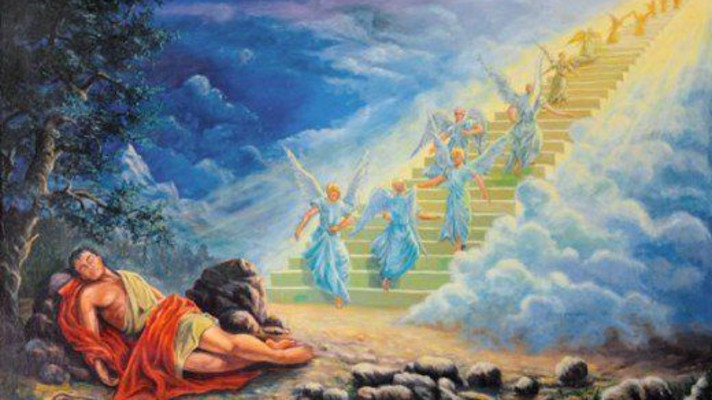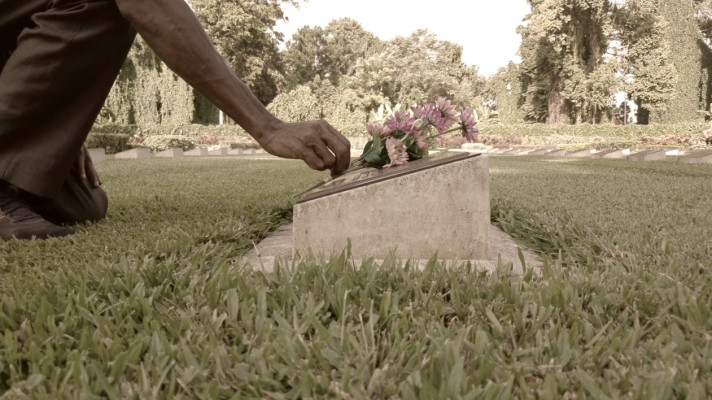As soon as Esau learns that Jacob has received his father’s blessing, he understands that he has been deceived and supplanted by his brother (Gen. 27:36), and he wants to kill him (Gen. 27:42). Rebekah is worried and wants to prevent this crime that would be fatal for both sons (Gen. 27:45). So, with the support of Isaac (Gen. 28:5), she urges Jacob to flee to her family (Gen. 27:43). On his way to exile, Jacob encounters God in a dream at a place that he will call Bethel, “the house of God,” and there will make a vow.
In this dream, Jacob sees an extraordinary ladder that is connected with God. The same Hebrew verb, natsav, is used to refer to the ladder that is “set up” (Gen. 28:12, NKJV) and the Lord who “stood” (Gen. 28:13, NKJV), as if the ladder and the Lord are the same thing.
The ladder is linked to the attempt at Babel to reach heaven. Like the Tower of Babel, the ladder is to reach the “door of heaven.” But while the Tower of Babel represents the human effort to go up and reach God, the ladder of Bethel emphasizes that access to God can be achieved only through God’s coming to us, and not through human effort.
As for the “stone” on which Jacob has put his head and had his dream, it becomes the symbol of beth-El, “the house of God” (Gen. 28:17; compare with Gen. 28:22), which points to the temple, the sanctuary, the center of God’s saving activity for humanity.
Yet, Jacob does not limit to the spiritual and the mystical his expression of worship and sense of awe concerning what had happened to him. That is, he wanted to respond in concrete, outward terms. Thus, Jacob decides to “give a tenth” to God, not in order to obtain God’s blessing but as a grateful response to God’s gift, which already has been given to him. Here again we see the idea of tithe long before the rise of the nation of Israel.
Supplementary EGW Notes
Threatened with death by the wrath of Esau, Jacob went out from his father’s home a fugitive; but he carried with him the father’s blessing; Isaac had renewed to him the covenant promise, and had bidden him, as its inheritor, to seek a wife of his mother’s family in Mesopotamia. Yet it was with a deeply troubled heart that Jacob set out on his lonely journey. With only his staff in his hand he must travel hundreds of miles through a country inhabited by wild, roving tribes. In his remorse and timidity he sought to avoid men, lest he should be traced by his angry brother. He feared that he had lost forever the blessing that God had purposed to give him. . . .
But God did not forsake Jacob. His mercy was still extended to His erring, distrustful servant. The Lord compassionately revealed just what Jacob needed—a Saviour. He had sinned, but his heart was filled with gratitude as he saw revealed a way by which he could be restored to the favor of God.
Wearied with his journey, the wanderer lay down upon the ground, with a stone for his pillow. As he slept he beheld a ladder, bright and shining, whose base rested upon the earth, while the top reached to heaven. Upon this ladder angels were ascending and descending; above it was the Lord of glory, and from the heavens His voice was heard: “I am the Lord God of Abraham thy father, and the God of Isaac.” The land whereon he lay as an exile and fugitive was promised to him and to his posterity, with the assurance, “In thee and in thy seed shall all the families of the earth be blessed.” This promise had been given to Abraham and to Isaac, and now it was renewed to Jacob. Then in special regard to his present loneliness and distress, the words of comfort and encouragement were spoken: “Behold, I am with thee, and will keep thee in all places whither thou goest, and will bring thee again into this land; for I will not leave thee, until I have done that which I have spoken to thee of.”—Patriarchs and Prophets, pp. 183, 184.
Our time, our talents, our property, should be sacredly devoted to Him who has given us these blessings in trust. Whenever a special deliverance is wrought in our behalf, or new and unexpected favors are granted us, we should acknowledge God’s goodness, not only by expressing our gratitude in words, but, like Jacob, by gifts and offerings to His cause. As we are continually receiving the blessings of God, so we are to be continually giving.
“Of all that Thou shalt give me,” said Jacob, “I will surely give the tenth unto Thee.” Shall we who enjoy the full light and privileges of the gospel be content to give less to God than was given by those who lived in the former, less favored dispensation? Nay, as the blessings we enjoy are greater, are not our obligations correspondingly increased? But how small the estimate; how vain the endeavor to measure with mathematical rules, time, money, and love, against a love so immeasurable and a gift of such inconceivable worth.—Patriarchs and Prophets, pp. 187, 188.




